Episodes
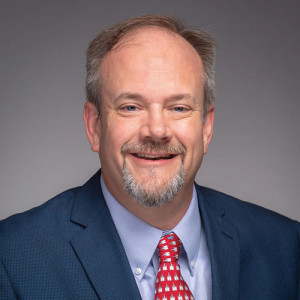
Monday Mar 25, 2019
Monday Mar 25, 2019
0:30 - McGrath Institute for Church Life: Science & Religion Initiative outreach to high school teachers to integrate science & faith
2:00 - Gulf Coast Faith Formation Conference (a good time to be away from Notre Dame)
3:00 - Summer seminars: Foundations Notre Dame, Foundations New Orleans, Capstone
4:00 - Foundations ND: lecture based, top scholars in specific disciplines, with workshops
6:00 - Foundations NO: experimental work and discussions
7:00 - Dialogue between science & theology teachers about their own specialties
8:00 - Capstone: topic-based theme & lecturers; special track for administrators; teaching practices
11:00 - Templeton Foundation study showing schools already trying to do this on their own
12:00 - The need to do this well and not engage in pseudoscience or gloss over tough questions
14:00 - ICL team making "housecalls" to individual schools
14:30 - Baglow textbook on science & faith
18:00 - Vast multiplication of interest from schools just since 2011
19:00 - Real motivations for believing faith is inconsistent with science: the need for hope [and, not made explicit, the appropriateness of hope]
20:00 - "I thought I was the only one"
21:00 - The historical and emotional impulse: rebellion against Christian hypocrisy
22:30 - Baglow makes the Fulton Sheen point: "I also hope THAT God doesn't exist!"
23:00 - The questions he wishes people would ask about God, meaning, science, etc.
24:00 - "What do you mean by 'God creates everything'"
25:00 - The nature of the discourse we encourage
26:30 - "I don't know"
27:00 - "When did science and religion enter into conflict?" - because they have not always been
28:20 - The true role of the university in integrating human wisdom
30:30 - Newman on evolution in the context of Development of Christian Doctrine
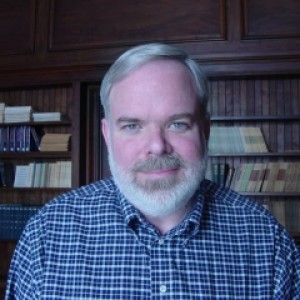
Monday Mar 11, 2019
Episode 050 - Craig Lent: decoherence, entropy, and faith
Monday Mar 11, 2019
Monday Mar 11, 2019
0:00 - Three issues: entropy, decoherence, Schrodinger vs. Dirac equations
2:30 - Schrodinger uses a non-relativistic Hamiltonian, with a p^2/2m kinetic energy
3:00 - Dirac equation absorbs special relativity by shifting from scalar to spinor field
4:00 - Quantum field theory as a further extension, accommodating fields that include many particles
5:00 - Field Lagrangian and all the particles and interactions in the Standard Model
6:00 - Even "everyday" gravity is in some sense accommodatable in the theory, just not extreme gravity capable of "separating out the vacuum"
8:00 - Decoherence, not to be confused with the measurement problem
9:00 - Decoherence arising from the interaction of a simple system with other systems
10:00 - Reduced density matrix begins to look classical
11:00 - Zurek and the work on decoherence: states that are "chosen" to survive interaction with the environment
11:30 - Measurement problem not solved by this work
12:30 - Entropy: the proposal that entropy is most fundamentally lack of information
progress from the special case of thermodynamic entropy, to statistical mechanics,
to von Neumann's quantum definition, to Shannon's information theory
21:00 - Craig's career: why is an engineer so interested in the fundamentals of physics?
24:00 - Journey of faith
30:30 - People of Praise in Indianapolis
31:20 - Final thoughts

Monday Mar 04, 2019
Episode 049 - Craig Lent: physics and humanity
Monday Mar 04, 2019
Monday Mar 04, 2019
0:00 - Introduction
1:00 - The power of physicalism/reductionism: a tremendously powerful method
2:00 - Course on physicalism and Catholicism; Sean Carroll's least hysterical "poetic naturalism"
3:00 - The lack of evidence for "emergence" in the sense of "downward causation"
3:30 - Soft and hard emergence
10:15 - Materialism vs. physicalism and reductionism: philosophical materialism
13:00 - Are human beings exhausted by this account of reality?
14:00 - The break with the mechanical universe of 19th century physics underappreciated
15:00 - Laplace's demon
16:30 - Thermodynamics
17:30 - Future not contained in the present
19:00 - Einstein & hidden variables
20:00 - Bell inequality experiments
24:00 - Entanglement
26:00 - Human experience: both, as physical, but also as having choices
27:00 - Quantum physics on many body systems
28:00 - The hard problem of consciousness
29:00 - The explanatory gap
31:00 - The tendency to explain the brain as "just like" some recent piece of technology
33:00 - Complexity of neurons, the continuing relevance of physical laws amid the complexity
35:00 - Continuing relevance of quantum effects at the level of neurotransmitter molecules, etc.
36:00 - Quantum effects in weather and rock mechanics
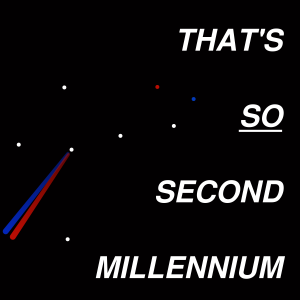
Monday Jan 07, 2019
Episode 041 - TSSM in 2019
Monday Jan 07, 2019
Monday Jan 07, 2019
Themes we'd like to grapple with in the Year of Our Lord, 2019, and beyond:
Last year was largely about the intellectual challenge leveled by many against religion, and we will continue talking about that as the podcast moves forward.
Paul's mission this year to work through Road to Reality
This year we also want to broaden the scope to include places where religion and faith converge, which means we're going to discuss psychology.
Looking forward to the SCS conference topic for this coming year: what it is, and has been, to be human. Neuroscience and what it implies for anthropology, and where it meets Catholic Christian anthropology coming the other way.
What is consciousness, anyway? What parts of the brain seem to be involved, and what do they do?
What is free will, anyway? Where are those breakpoints where the soul would have to affect the body in order for that to even work?
Crisis points in the way people in the post-Christian West approach the world.
Center for Ethics & Culture annual conference in 2018: Wilfred McClay & John Waters
"we care about everything, but without God... we have responsibility for everything, but we know that we are flawed and unable to provide solutions"
Post-Christian in this context includes both people who have explicitly renounced the Christian faith of the West and those who have a Christian identity in their back pocket somewhere but in reality are not relying on Jesus Christ or his teachings to guide their lives in any conscious way.
Christianity is a demanding religion. If you suck away all the grace and help it promises, but leave some of its demands for social justice or purity of intention, you have a recipe for constant internal condemnation.
Link:
Wilfred McClay (University of Oklahoma) on “Guilt in the Immanent Frame”, and John Waters on “The Importance of Not Being God: A Higher Power Is Indispensable for Human Beings and Human Societies”
No, not THAT John Waters.
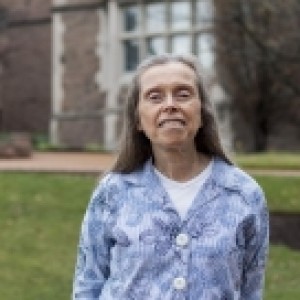
Monday Dec 10, 2018
Episode 037 - Jill Pasteris: Christian scientist
Monday Dec 10, 2018
Monday Dec 10, 2018
3:00 Jill's career
5:00 Finding companionship as Christian scientists (not Christian Scientists...that's different...)
7:00 "Spiritual beings having a human experience"
8:00 Bioapatite; clearing up "loose ends" making a 20 year career arc
9:00 Apatite and phosphate: environment
13:00 Flint, Michigan: lead and protective minerals
14:00 Raman spectroscopy
16:00 Raman on the Mars 2020 rover; Alian Wang
17:00 Laser pointers, cat videos [the brave new world we live in]
18:00 The physics of Raman
19:00 Why lasers and Raman went hand in hand
20:00 Rayleigh vs. Raman scattering
21:00 Raman spectra
22:00 Raman: a (usually) nondestructive technique
23:00 The lecture example and the ease of sample prep for Raman
25:00 Raman peak heights and thermodynamics
26:00 Fingerprinting vs. understanding
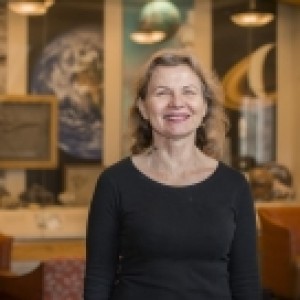
Monday Dec 03, 2018
Episode 036 - Anne Hofmeister on Galactic Rotation, Math, and Glass
Monday Dec 03, 2018
Monday Dec 03, 2018
The times below are continuations from the last episode. My opening is about 1:30, and then we start with galaxy motions at "26:00".
26:00 Galaxy motions
27:00 Galaxy rotation curves: do not match Keplerian orbits
28:00 Galaxies spin more like records (laggy soft records); mass distribution is nothing like the Solar System
29:00 Hurricanes as a better analogy for galaxies
30:00 Stars in a galaxy move in local organization
32:00 Nebulas
34:00 The opposite extreme: rigid body rotation
35:00 Gravitational attraction between stars creating coherence
36:00 Curiosity that gravity and electrical forces are both inverse square laws
37:00 Poisson's equation
38:00 Summing densities in Poisson's inhomogeneous term is physically meaningless; intensive quantities can't be summed that way
40:00 Gauss' theorem: flux through a surface and quantity within a volume
41:00 Summing is for extensive variables
42:00 Pressure an ambiguous variable
43:00 Future work
44:00 Thermal expansivity: Giauque
45:00 Problems with the glass transition measurements done in the past: need to completely drive out water from the experimental charges
48:00 Wrapup

Monday Nov 26, 2018
Episode 035 - Anne Hofmeister Shakes Up Earth Science
Monday Nov 26, 2018
Monday Nov 26, 2018
TSSM goes heavy: hard-hitting journalism from one of science's great controversialists, Anne Hofmeister. Intrigued? Disagree? Write me an email (giesting@alumni.nd.edu) or look her up at Washington University in St. Louis' EPS department website.
The times below are keyed to the start of the interview and ignore my opening (just over 2 min).
0:00 Introduction
1:00 Anne's background (sorry, this part Anne was talking so quietly that I can't seem to fix it with Audacity, but bear with us; we moved the microphone and figured some things out and it gets better)
2:00 Spectroscopy and heat transfer
3:00 Thermal conductivity experiments and their pitfalls
5:00 Criticism of the history of thermodynamics and heat transfer; identification of light and heat
6:00 Problems with equilibrium and elastic collisions in theories of thermodynamics
8:00 Criticism of phonon theory
10:00 Electron and vibrational transfer of heat decoupled; metals and heat transfer
13:00 Garnet
14:00 Earth's interior: convection, the Rayleigh number
15:00 Viscosity
16:00 The Earth's mantle: nearly all solid
17:00 Plate tectonics without mantle convection
18:00 An even more radical idea: heat is being trapped inside the solid Earth
19:00 [there was a distortion I had to cut]
20:00 Implications: heat generation is in the crust (this part is widely known!)
21:00 Implications: the core is melting, not solidifying?
22:00 The geodynamo and magnetic field
23:00 The core: buffered at the temperature of melting high pressure iron
24:00 Magnetic modes diagram for the planets: spin and magnetic field
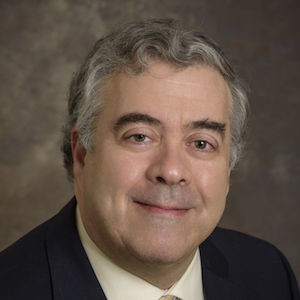
Monday Nov 19, 2018
Episode 034 - Stephen Barr on Why to Be a Religious (and Catholic) Scientist
Monday Nov 19, 2018
Monday Nov 19, 2018
~0:00 Question: advice for students
1:00 Don't be afraid to be a religious scientist
2:00 Particular issues
3:00 Keep awake to the wonder of the world
4:00 Bill: ignorance of the common man about both science and religion
5:00 Modern Physics and Ancient Faith
6:00 Christopher Baglow: science and faith textbook
7:00 Church beginning (at long last?) to address the need to catechize & educate about this
Phone ringing can't be excised without gutting Bill's question!
8:00 Media's portrayal of religion as boring and science as exciting
9:00 Science explores the world as it is, but there must be issues beyond: "why" issues
10:00 Intellectual freedom necessary for science to make any sense
11:00 No reason for Catholics to fear science uncovering fatal problems for faith
12:00 20th century overturn of 19th century mechanistic, unfree universe
13:00 Advent of the big bang theory, verification through microwave radiation
14:00 Bill: "free will on steroids" in uneasy coexistence with materialism
15:00 Barr: inherent conflict there
16:00 Pernicious recurring feature of intellectual history: excuses not to be free
17:00 Bill: does faith make one a better scientist?
18:00 Wonder: "ears to hear and eyes to see"
19:00 Summation: join Society of Catholic Scientists!
20:00 Sign off

Monday Nov 12, 2018
Monday Nov 12, 2018
Minute Comment
0:00 Paul introduces
1:00 Bill: Lemaitre announcement
2:00 Lemaitre: faith & science not opposed
3:00 Barr: Lemaitre announcement
4:00 Ignorance of Lemaitre
5:00 Ignorance of the Christian, Catholic origin of science & famous Catholic scientists
6:00 Barr: late 19th century critical period for the forging of the myth of Church as anti-science
7:00 Science only professionalized in the late 19th century, looking for influence
8:00 More famous Catholic scientists
9:00 Mission of the Society of Catholic Scientists; religious people looking askance at scientists, 10:00 Scientists timid about showing their faith in the presence of a few loud atheists
11:00 Catholic scientists joining SCS & finding others like themselves
12:00 Witness to the world
13:00 Conferences, past and future: next June at Notre Dame
14:00 2017: origin of universe, life; 2018: mind and matter
15:00 2019 conference: what is it (and has it been) to be human; speakers from outside the faith
16:00 Past non-Catholic conference speakers
17:00 Peter Koellner's talk at 2018 conference
18:00 Koellner and Godel's theorem
19:00 Neaderthals, language, reason
20:00 Godel's beliefs about mind and mathematical truths
21:00 Mathematical truth and religious truth
22:00 Depth & sophistication of the law that governs the universe
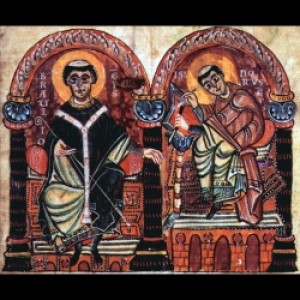
Monday Nov 05, 2018
Episode 032 - Science and Saints
Monday Nov 05, 2018
Monday Nov 05, 2018
Intro: Nobel Prize announcements
Donna Strickland
Nadia Murad
Segue: Lemaitre press release
Transition: the early 20th century golden age from Chesterton to Fulton Sheen
Theme: All Saints Day
Augustine
Isidore
Albert the Great
Roger Bacon
Nicolaus Steno
Gregor Mendel
Georges Lemaitre
Please leave us feedback here by hitting the "Email Paul" link or using the "Facebook" link and commenting or messaging us there.
Image: Braulio of Saragossa and Isidore of Seville, writing his Origins (Etymologies)

